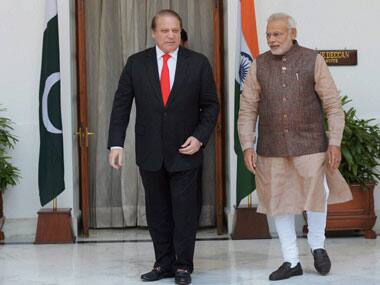Theatrics are over. Prime Minister Narendra Modi has hit the ground running in his outreach to seven Saarc countries and Mauritius. His diplomacy of symbolism with his Pakistani counterpart Nawaz Sharif hit off quite well. Modi said all that he needed to tell Sharif on the all-important terror issue. But diplomacy needs to move beyond symbolism. It is all the more relevant in context of Pakistan. [caption id=“attachment_1547299” align=“alignleft” width=“380”]  Narendra Modi and Nawaz Sharif. PTI[/caption] But it is unlikely to play out that way with regard to Pakistan. That is why Modi must press the pause button on engagement with Pakistan. Pakistan has been a difficult neighbour and has proven to be the graveyard of Modi’s two immediate predecessors’ Utopian ambitions of turning a new leaf with Pakistan: Atal Bihari Vajpayee’s famous bus ride to Lahore in 1999 and then the infamous Agra Summit of July 2001; and Manmohan Singh’s embarrassment at his summit meeting with his Pakistani counterpart Syed Yusuf Raza Gilani in Sharm el-Sheikh, Egypt, in July 2009. Besides, Pakistan’s shenanigans on the terror front, whether in India or on Indian interests abroad (like Herat, Afghanistan, recently) are unlikely to end. So is the case of Pakistan’s continued ceasefire violations along the International Border and the Line of Control. Last year there were 196 ceasefire violations by Pakistani troops, more than twice in 2012, as per the figures given by the then defence minister AK Antony. This year too, the same script is being followed. Yes, Nawaz Sharif may not have ruffled Indian feathers by not harping on the K-word, something for which the Pakistani media has hauled him over coals on Wednesday. Yes, Nawaz Sharif got an earful from Modi on Indian concerns about the terror issue and did not utter a word about Pakistani concerns during his India visit on 26-27, May. The Pakistani premier indeed sounded like a man of peace during his 30-hour stay in New Delhi. But the hard fact remains that it is only the Pakistani military establishment, not the civilian government of Pakistan, which is capable of changing Pakistan’s India policy. Till that happens, if at all it happens, nothing will change on the ground in the India-Pakistan template. The two prime ministers talked about the need for boosting bilateral trade while the two governments navigate through contentious issues and their foreign secretaries meet and carry the process forward. But the ground realities are much different. Trade is very important nowadays for all countries and economic diplomacy is the most practiced form of all forms of diplomacy. However, the merits of economic diplomacy hardly come into play in the Indo-Pak context and bilateral trade is hardly a potential game-changer. Consider these facts. India’s total foreign trade in 2011-12 was a little less than $800 billion — almost $306 billion in exports and $489 billion in imports, as per the official statistics of the Indian ministry of commerce. Now consider the India-Pakistan bilateral trade share in this overall Indian external trade of $800 billion. This was a meager $2.6 billion in 2012-13, as per the website of Ministry of External Affairs on profile of Pakistan last updated in April 2014. The implication is clear. Indo-Pak bilateral trade comprises just 0.32 percent in the overall Indian external trade basket. The question is: does India really stand to gain anything from trading with Pakistan even if presuming that Indo-Pak trade ties take wings overnight and even quadruple tomorrow? Now here is a caveat. I am not arguing one bit that India should not smoke the peace pipe with Pakistan and should not normalise relations with this important contiguous neighbour. India should, but not now. This is hardly an opportune moment for that. The question is of priority. I do not see Pakistan anywhere on India’s must-do-now list of things. Modi has done well so far in reaching out to Modi and Nawaz Sharif has done even better in graceful accepting Modi’s invite to attend his inauguration ceremony even though Sharif himself was snubbed by the then UPA government when he had invited the then premier Manmohan Singh. Now after the theatrics the ball is in the court of Pakistan Army. Everything is predicated on the next move from Rawalpindi. Modi’s sole mantra should be: trust, but verify. In any case, Modi’s foreign policy plate is already full and more pressing engagements are awaiting him with key countries like Japan and Russia, powerful neighbour like China, India’s immediate neighbourhood minus Pakistan, and of course the sole superpower of the world, the United States. Pakistan does not figure anywhere on Modi’s priority list. Last, but not the least, the Modi-led BJP was swept to power by the voters with a clear majority for the first time in three decades only on twin issues of overall economic development with a sharp focus on infrastructure and a clean, corruption-free government. Modi should accord top priority to these issues. The writer is a Firstpost columnist and a strategic analyst who tweets @Kishkindha.
Modi said all that he needed to tell Sharif on the all-important terror issue. But diplomacy needs to move beyond symbolism. It is all the more relevant in context of Pakistan.
Advertisement
End of Article
Written by Rajeev Sharma
Consulting Editor, First Post. Strategic analyst. Political commentator. Twitter handle @Kishkindha. see more


)

)
)
)
)
)
)
)
)



